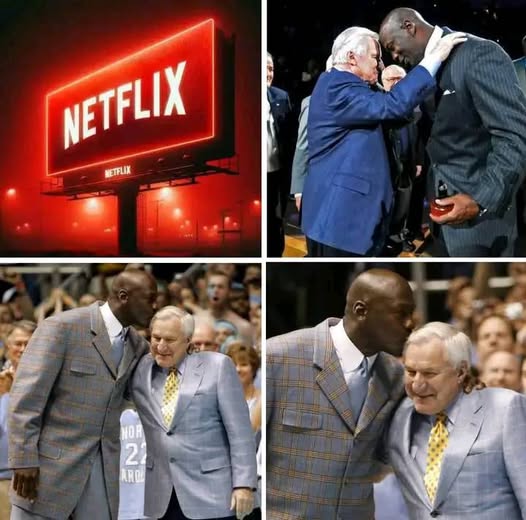The release of Netflix’s newest sports documentary has ignited a firestorm of debate across the college basketball landscape. Titled simply Dean, the film explores the life, legacy, and layered complexity of legendary North Carolina head coach Dean Smith — a man who is revered by many as a pioneering force in college basketball but criticized by others for what they view as a controversial tenure and complicated impact on the sport. From diehard Tar Heel loyalists to rival fanbases and critical historians of the game, Dean has become more than just a documentary; it has reopened old wounds, sparked fresh debates, and reminded the nation of how much emotion still surrounds one of the most iconic, and polarizing, figures in college athletics.
Dean Smith’s coaching résumé is undeniably staggering. During his 36 years as the head coach of the University of North Carolina men’s basketball program, Smith compiled 879 career wins — an NCAA record at the time of his retirement in 1997 — and led the Tar Heels to two national championships, 11 Final Fours, and 17 Atlantic Coast Conference titles. He coached numerous players who would go on to stardom in the NBA, including Michael Jordan, James Worthy, Vince Carter, and Antawn Jamison. His signature four-corners offense and the strategic genius with which he approached every game earned him widespread acclaim as one of the sport’s great innovators.
But Dean doesn’t just focus on the accolades. The documentary seeks to paint a fuller portrait of the man behind the whistle — not just the Hall of Fame coach but the human being whose career was marked by paradox and purpose. Narrated in part by some of his former players, including a rare and emotional appearance by Michael Jordan, the film traces Smith’s Kansas roots, his integration of the UNC basketball program in the early 1960s, his staunch opposition to the Vietnam War, and his deep commitment to civil rights. It delves into the coach’s complicated relationships with players, his cerebral coaching style, and the pressures he faced navigating a fiercely competitive sport during times of dramatic social change.
Yet it is precisely this humanization — this glowing, sometimes bordering on hagiographic treatment — that has stirred a reaction from fans and critics alike. For many North Carolina faithful, Dean is a long-overdue tribute to a man they believe changed the game and changed lives. Social media has been flooded with emotional testimonials from Tar Heel supporters who say the film brought them to tears. “Dean Smith is the reason I fell in love with Carolina basketball,” one viewer wrote on X (formerly Twitter). “Seeing this documentary reminds me why he’s not just a coach to us — he’s a symbol of what’s good and just in college athletics.”
But not everyone agrees.
For a vocal segment of the basketball community — particularly fans of rival programs like Duke, NC State, and Kentucky — the film’s tone and editorial direction feel overly reverent, at times revisionist. Critics have pointed out that Dean largely glosses over some of the less flattering aspects of Smith’s legacy. They cite his reluctance at times to embrace the more businesslike direction college basketball was taking in the 1990s, his strained relationships with some former assistants, and the fact that while Smith was progressive on social issues, he operated within a deeply conservative institutional framework for most of his career.
More pointedly, others have questioned how the film fails to fully interrogate Smith’s approach to player autonomy and his control over the UNC basketball “system.” While many former players speak lovingly of their time under Smith, there is little mention of those who clashed with his methods or who felt stifled by the rigid structure he demanded. “It was Dean’s way or the highway,” one anonymous former ACC player is quoted as saying in an unaired clip, leaked online and sparking further controversy. “You didn’t just play for Carolina — you conformed to Dean Smith’s idea of what a Carolina man was. That worked for some. Not for everybody.”
Then there is the ever-present shadow of NCAA scrutiny. Though Smith was never formally charged with any major NCAA infractions during his tenure, whispers of “creative recruiting” tactics, backchannel influence, and the infamous “Carolina Way” as a veneer for deeper systemic issues have lingered in some corners of the sport for decades. The documentary, however, steers clear of exploring these shadows in any depth, instead presenting Smith as an unimpeachable moral compass during one of the most corruptible eras in college basketball history. For critics of the program or those seeking a more journalistic balance, this omission is glaring.
Sports media commentators have weighed in with mixed reviews. ESPN’s Jay Bilas praised the documentary’s emotional resonance and high production values but admitted it left him wanting “more honesty and less hero worship.” On the other hand, former UNC player Kenny Smith (no relation), who was interviewed extensively for the film, defended the portrayal. “Dean wasn’t perfect — none of us are,” Smith said during a press junket. “But his intentions, his integrity, his impact… they’re beyond reproach in my book. He didn’t just build a program. He built men. He stood for something when a lot of people were silent.”
That sentiment — of Dean Smith as not just a coach but a moral leader — forms the heart of Netflix’s thesis. The film makes heavy use of archival footage showing Smith marching with Black students during the civil rights era, confronting racial inequality, and even challenging North Carolina’s death penalty laws later in life. It is this image — of Dean as a quietly revolutionary figure cloaked in the conservative garb of college sports — that the filmmakers clearly want viewers to walk away with.
Still, in the polarized climate of today’s sports discourse, such idealism can backfire.
Within hours of its release, Dean shot to the top of Netflix’s most-watched list in the U.S., but it also drew thousands of heated responses, with some demanding a more balanced follow-up film and others calling the criticism an example of “anti-Carolina bias.” The debate has even bled into political and cultural commentary circles, with some praising Smith as a model for socially conscious leadership, while others caution against placing athletic figures on pedestals in ways that obscure accountability and nuance.
In the days since its debut, former players, analysts, and fans have taken to podcasts, YouTube channels, and X Spaces to dissect every frame of the documentary. Some have argued that Dean should be celebrated precisely because it focuses on the good — that in an era where documentaries often seek to “expose” rather than uplift, a film that highlights a man’s positive legacy is refreshing. Others counter that documentary filmmaking has a responsibility to wrestle with complexity, and that Dean misses an opportunity to engage in deeper truth-telling about power, control, and the cult of personality in college sports.
Netflix, for its part, has issued a brief statement defending the film’s editorial direction, noting that the documentary was never intended to be “an investigative piece” but rather “a character-driven tribute to one of college basketball’s most influential figures.” Still, given the response, rumors have already begun to swirl that a follow-up documentary — possibly from a different production team — may emerge to offer a more critical perspective.
For now, Dean remains the talk of the basketball world — a powerful, beautifully made film that has divided as much as it has inspired. Perhaps that’s fitting. Dean Smith himself was never a man easily summed up by wins and losses, accolades or controversies. He was a study in contradictions: a traditionalist with a progressive heart, a control-oriented coach who preached freedom of thought, a deeply principled man who operated in an imperfect system. Whether you view Dean as a deserved celebration or a missed opportunity, it has succeeded in one crucial way — it has reignited a national conversation about the soul of college basketball, the meaning of legacy, and the fragile line between myth and man.
In a world eager for easy heroes and simple villains, Dean Smith remains a reminder that greatness often resides in the gray areas. Netflix’s Dean has dared to reenter that gray, and in doing so, it has brought to light once more the full measure of a man who shaped a generation, challenged a system, and left a legacy that still refuses to sit quietly on the shelf of history. Whether you cheer or cringe, the conversation is far from over. And perhaps that’s the truest tribute of all.



